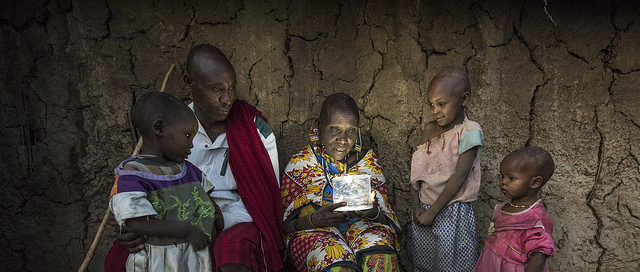Three Right Livelihood Award winning Laureates met with Swedish parliamentarians today in Stockholm at a seminar addressing the risk of climate change to worsening global health. The Laureates emphasized how bottom-up approaches can reduce the spread of infectious diseases by improving community-level social and environmental resilience.
The newest climate change report will “provide the roadmap by which policymakers will hopefully find their way to a global agreement to finally reverse course on climate change,” according to IPCC Chair Rajendra Pachauri. As decision makers around the world continue to grapple with the implications of the most recent synthesis report of the Intergovernmental Panel on Climate Change (IPCC) which states that warming of the climate system is “unequivocal”, a growing number of human rights activists, food security watchdog groups and health practitioners alike are joining environmentalists in the call for more focus on the risk posed by climate change to public health worldwide.
Among those challenging policy makers to do more to face the triple threat of climate change to public health, food security and livelihoods are three Right Livelihood Award (RLA) ‘alternative Nobel prize’ winning Laureates who spoke at the Swedish parliament and at the seminar co-organized by SIANI at Stockholm Environment Institute titled “Global Health, Climate Change, and the Environment – a rights based approach” along researchers from LUCSUS – Lund University Centre for Sustainability Studies who presented their most recent research findings on the nexus of climate change and global health.
The talks began with a rousing talk by the cofounder of Nigeria’s Environmental Rights Action (ERA) Nnimmo Bassey (RLA 2010) who discussed how bottom-up approaches can be taken to reduce the burden of disease using science to influence policy. This was followed by a presentation from Biovision founder Hans Herren (RLA 2013) who pointed to the threat to food security and food nutrition due to the rise of GMOs in the food supply. A prerecorded video from RLA Laureate and founder of the Small Planet Institute, Frances Moore Lappé (RLA 1987), went further by provoking the audience to consider the current food crisis by asking, “How can 1 in 4 people today be nutritionally deprived? How can food supply be disconnected from our nutritional needs? We need to ask if the relationships we are building are serving life”.
“With the impact of climate change being felt perceptibly all around the world, the need of the hour is for us to fully understand its effects on public health and food security, particularly in the Global South,” said Mr. Ole von Uexkull, Executive Director of the Right Livelihood Award Foundation. “Our hope is that such events will serve to deepen our knowledge about this urgent global challenge, so that each of us can in our own field of work take practical measures towards mitigating the harmful impacts of climate change.”
The diverse audience heard from the Laureates and researchers about ways that all countries would be impacted, with a particular focus on how drastically impacts would be felt by those living in countries in the Global South where the risk of food insecurity and increasing levels of infectious diseases is even greater. An evening event was also hosted at the headquarters of the Stockholm Environment Institute (SEI), which was also well attended by members of the public. SEI Researcher, Linus Dagerskog, also joined the panel discussion.
“Much of the burden of disease in tropical regions can be attributed to environmental factors, yet it is remarkable that this strong link is barely reflected in the current political rhetoric or scientific debate on global health,” said Professor Lennart Olsson, LUCSUS Director, and Coordinator for the Right Livelihood College, Lund Campus. “In the context of climate change, there are two further compelling reasons for emphasizing this link,” Professor Olsson continued. “Climate change will have severe impacts on health of people who live in poverty. To make matters worse, ill health is a major barrier to successful local adaptation and prosperity in settings exposed to climate change. Taking proactive, preventative environmental actions could promote health, and adaptation to climate change.”
